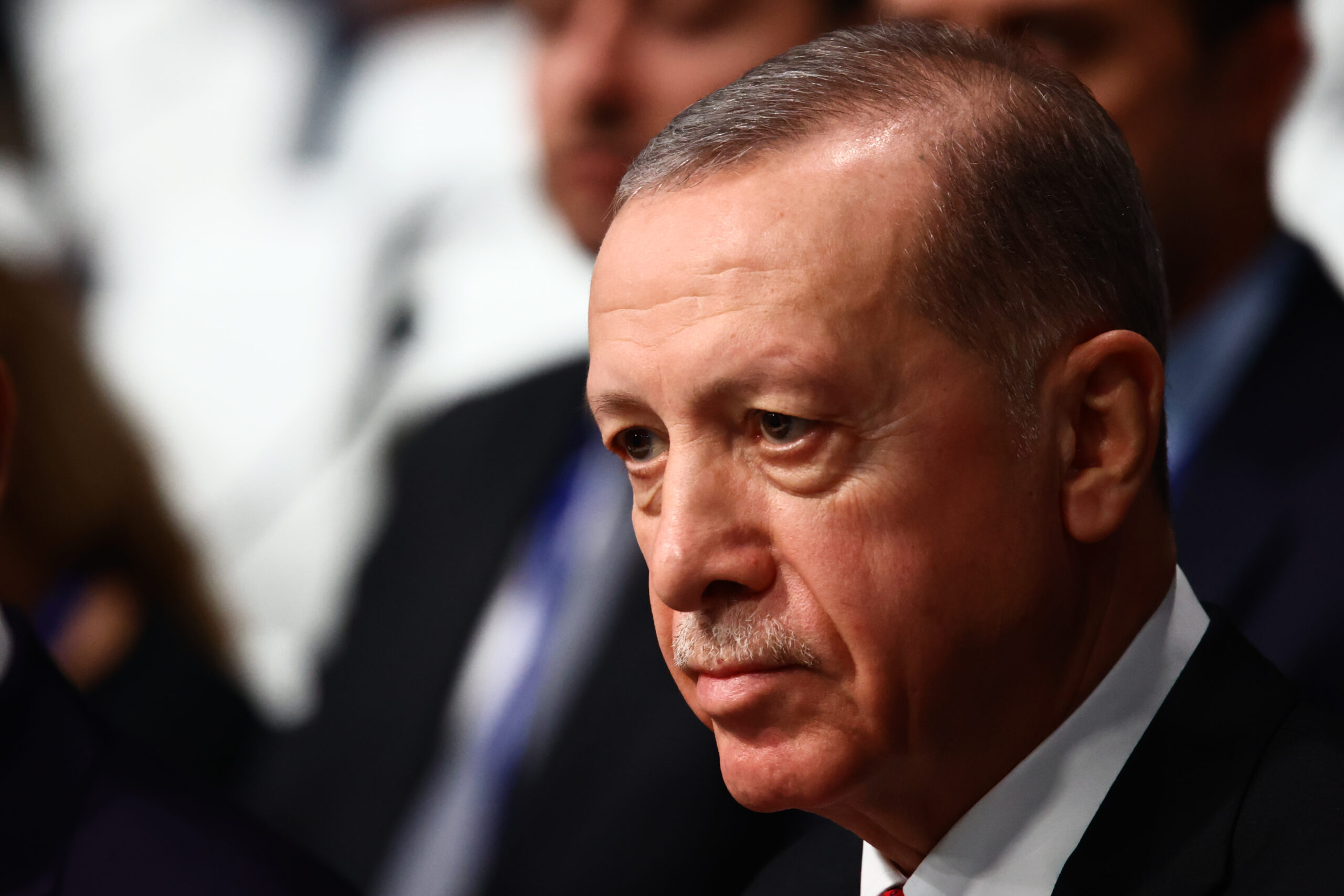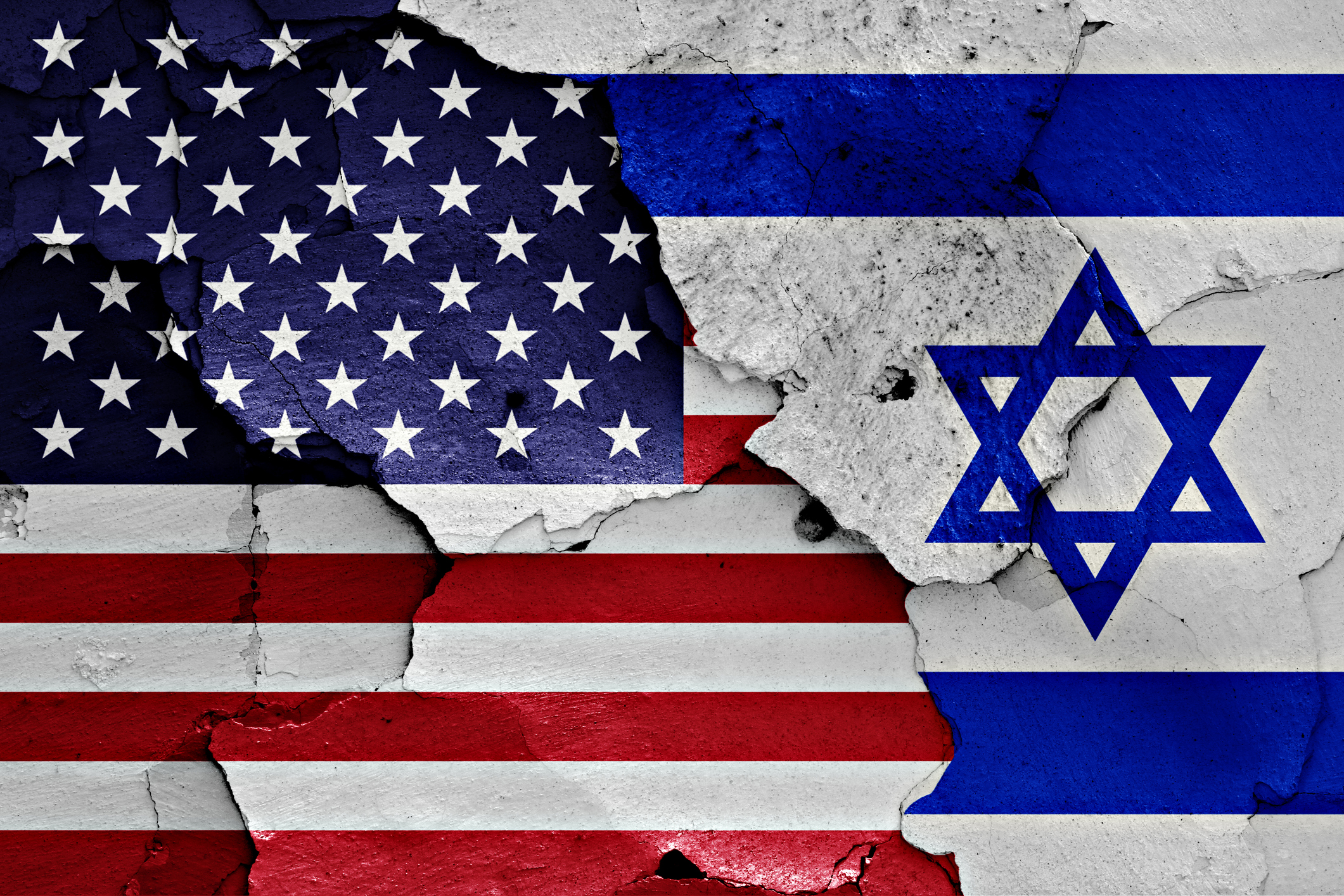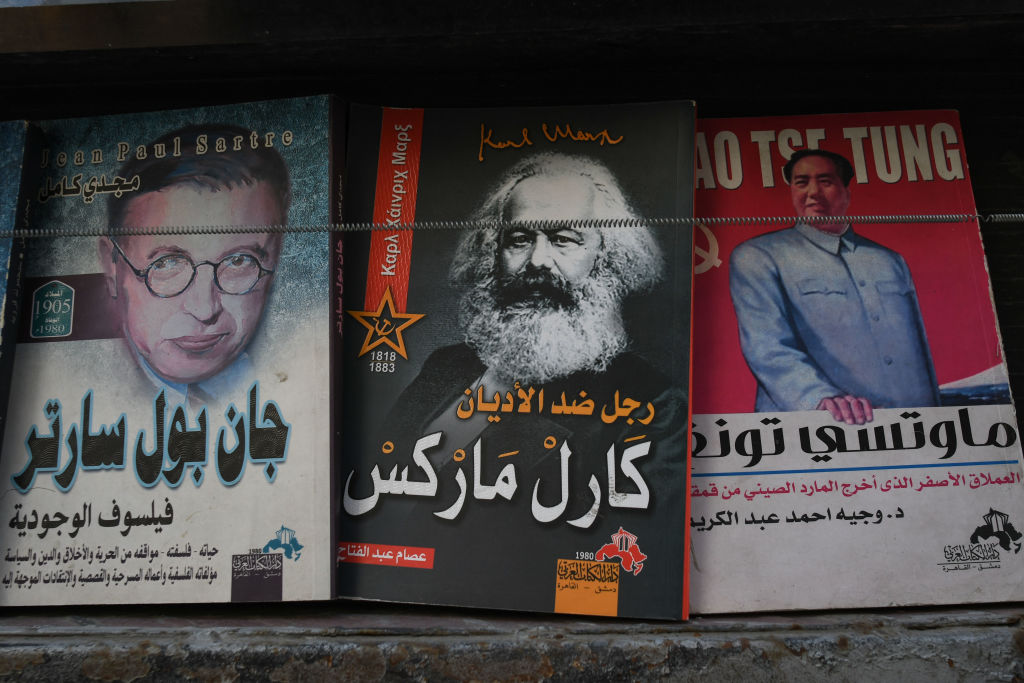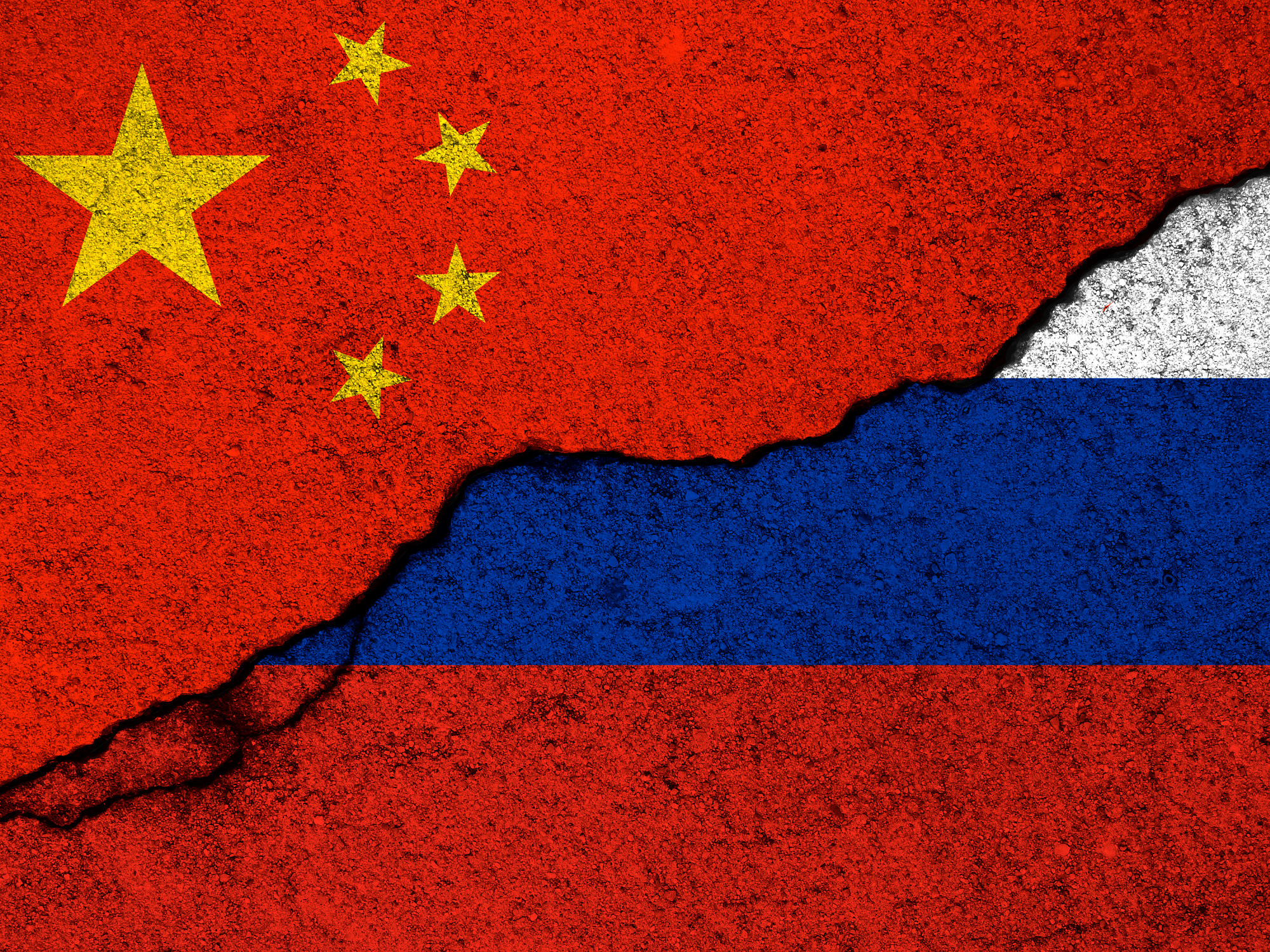Hamas is a less significant existential threat than the collapse of U.S. leadership.
Carving Turkey Away from NATO

China and Russia may be using Iran and Hamas for a sinister grand design.
As the initial shock and disorientation of the October 7 massacre in Israel begins to recede, Americans must further contemplate Iran’s involvement in the attack. In particular we must face the possibility that Iran’s support for Hamas is in turn part of a larger scheme, approved, directed, and possibly conceived by still more powerful actors: namely, China and its accomplice Russia. These agents of disorder would benefit from conflict in the Middle East, both as a distraction and as a wedge to divide Western alliances, countries, and their constituent populations, helping to clear the path for China’s hegemony.
In addition to China and Russia’s general commitment to sowing acrimony, they may have a more specific objective: to distance, and ideally to disconnect, Turkey from NATO and the European Union.
How would China and Russia benefit from this?
China seeks a hub-and-spokes restructuring of geopolitics along non-Western lines, with the Chinese Communist Party (CCP) at the center. Both China and Russia resent NATO’s recent expansion: Finland joined NATO in April and Sweden will soon follow. Recently Turkey agreed to cease withholding its approval, critical because acceptance of any new NATO member requires unanimity. NATO is now comprised of 31 countries (Sweden will be number 32 when the lone holdout, Hungary, relents), and China and Russia may reckon themselves obliged to undermine this formidable obstacle to their ambitions.
The sole Muslim-majority member of NATO, Turkey is a formidable strategic asset. This makes the possibility of decoupling it from NATO a powerfully attractive prospect for the West’s adversaries. Situated in a vital location, on the Black Sea and the Mediterranean, it is also the only nation bordering Europe (Greece and Bulgaria), Asia (Georgia and Armenia), and the Middle East (Syria, Iraq, and Iran). Cleaving Turkey from NATO would mean taking out many U.S. and Western bases and intelligence gathering posts—most or all of which China, Russia, and Iran would surely step in to replace. Turkey’s armed forces are NATO’s second-most numerous and double those of third-place France, an important consideration when a large-scale conventional war seems more likely than at any other time since 1945.
China and Russia know that high-definition, streaming images showing Israel—“America’s closest ally,” to quote countless American politicians—using American bombs, weapons, and intelligence against Sunni Muslims in Gaza will undoubtedly provoke an intense anti-American and anti-European reaction among fellow Sunni Muslims in Turkey.
The evidence is already accumulating.
On October 25 in a speech to the Turkish parliament, President Tayyip Erdoğan said that “Hamas is not a terrorist group, it is a group of liberators who protect their land.” He went on: “you will not find any other state [than Israel] whose army behaves with such inhumanity.” When discussing a recent meeting with Prime Minister Benjamin Netanyahu over pursuing friendlier relations, President Erdoğan said, “I shook this man’s hand, we had good intentions but he abused us. Relations could have been different but that will no longer happen, unfortunately.” Turkey’s leader then attacked “Western powers [who] shed tears for Israel and do nothing else,” deploring their “incapacity to stop Israel.” President Erdoğan also levied an unprecedented attack against his Western allies in NATO: “That those who mobilized the world in favor of Ukraine did not speak out against the massacres in Gaza is the most blatant sign of their hypocrisy…as long as innocent people continue to die in Gaza, no ship or plane sent to our region will bring peace.” The audience of Turkish legislators chanted “down with Israel” and “Allahu Akbar.”
On October 29, in a celebration in Istanbul commemorating the Republic of Turkey’s centenary, President Erdoğan delivered remarks excoriating Israel (which he labeled “an occupier”) and scolding Western allies. So intemperate were his words that if one did not know their source, they would have seemed to have originated from a leader in Damascus, Tehran, or Sana’a. Declared Erdoğan: “Israel has been openly committing war crimes for the past 22 days, but the Western leaders cannot even call on Israel for a ceasefire, let alone react to it…. We will tell the whole world that Israel is a war criminal. We will make preparations for this. We will declare Israel a war criminal.” The enthusiastic crowd waved Palestinian flags; Erdoğan himself had instructed that, at the event, “only our flag and the Palestine flag will wave.” Having swiftly condemned Erdoğan’s speech, the Israeli Foreign Ministry is recalling its diplomats. Turkey responded by recalling its ambassador to Israel.
This month’s Middle East calamity has accelerated the deterioration of Turkey’s relationship with the United States and with the rest of Europe. Unlike the rest of NATO membership, Turkey does not designate Hamas as a terrorist organization. And on October 18, the U.S. Treasury Department issued sanctionsagainst ten named Hamas officials it designated as “financial facilitators,” four of whom it described as “portfolio managers” based in Turkey for Hamas’ international investments.
In June, President Erdoğan was re-elected to a third term. He does not stand again for re-election until 2028. He casts himself as a 21st century counterpoise—a retort—to last century’s secular, Western-embracing Mustafa Kemal Atatürk, modern Turkey’s founder and national hero. President Erdoğan is proud of his countrymen’s Turkish and Sunni Muslim identity, history, and culture. He is willing to ignore, disagree with, and rebuke the United States when he believes, as he does often, that Turkey’s interests and American interests diverge or conflict.
And although Turkey doesn’t belong to the European Union, it has sought admission for the past 24 years and enjoys trade agreements conferring many benefits of membership. Turkey’s entry into the E.U. has been put on hold by members’ concerns over Ankara’s human rights violations and their doubts about the Turkish government’s commitment to the rule of law.
In September, the E.U. adopted a European Parliament report recommending that Turkey not be admitted under current circumstances. The report recommended that the E.U. consider “a parallel and realistic framework” for economic ties with Turkey. Translation: a close membership-equivalent, at least by the European Parliament’s estimation, but still no official membership. At once President Erdoğan announced that “the E.U. is trying to break away from Turkey,” adding portentously, “we will make our evaluations against those developments and if necessary, we can part ways with the E.U.” Now Erdoğan is evaluating whether Turkey is better off with or without the E.U. and NATO.
Unseen Chess
Just two days before Hamas’ attack on Israel, on October 5, a Turkish drone was downed in Syria by the U.S. in “self-defense” (the U.S. Pentagon’s description) even though there was no evidence that Turkey had been intentionally targeting U.S. forces. This is the first time Washington shot down an aircraft of its NATO ally Turkey, and the incident marked a rare use of force by one NATO member against another. But at least the Turks aren’t known for their prowess at fighting or their tendency to hold a grudge….
China, Russia, and of course Iran are well aware that a drawn-out war in Gaza, with tens of thousands of Palestinian casualties and hundreds of thousands, or more, Palestinian refugees (already being called a second Nakba) would give Erdoğan cover, and perhaps even a mandate from an irate Turkish electorate, to sunder ties with the E.U. and NATO, which would likely lead to closer relations with China.
Those who argue that Sino-Turkish relations have historically been distant have a point. In the past Turkey has remonstrated with China over the mistreatment of its Uighurs, a Turkic Muslim minority group. However, China is able to promise Turkey support on two issues resonant in Turkish aspirations, issues upon which the United States, NATO, and the E.U. cannot yield.
First, China might offer unconflicted allyship in Turkey’s struggle to crush the insurgency by the Kurdistan Workers’ Party (the PKK), which has fought a 45-year separatist guerilla war against the Turkish government. By contrast, the U.S. must follow a more neutral, centrist position. Washington needs friendly relations with Turkey, but also seeks help from various disputatious Kurdish groups to check Sunni Islamic fundamentalism and other anti-American sentiment in the region. But the sundry Kurdish factions there, including the PKK and others, offer no obvious utility to Beijing, and so China might unreservedly abet Turkey in its campaign to defeat the PKK. China might also use economic and diplomatic levers to prod Iran, Iraq, and Syria to stop their foot-dragging and cooperate on this with Turkey, which until now they have not been eager to do, perhaps believing it advantageous for the PKK to divert Turkey’s attention.
Second, and even more destabilizing, China could dangle in front of President Erdoğan a finer prize: undisputed control of a unified Turkish-governed Cyprus. China could entice President Erdoğan by pledging to support a Turkish effort to eliminate all Greek political control or influence on the island, and possibly—in what would be a horrifying reprise of Kemal Atatürk’s mass deportations of Greeks from Anatolia—expel Greeks from Cyprus entirely.
Ever since the 1974 Turkish invasion of Cyprus and the brief civil war that ensued (which internally displaced 180,000 Greeks and 50,000 Turks), Cyprus has been quiet and stable. The ceasefire which bisected the island into a Turkish-controlled northern half and a Greek-governed southern half has stood, as has the diplomatic fiction that the Greek-led government in Nicosia is sovereign over the whole island. Cyprus is not a NATO member, and so the Cypriot government and Cyprus’s Greek population would not enjoy the protection of NATO’s Article 5 on collective defense, namely that “an attack on one is an attack on all.”
Many do not remember or have never known about this inconspicuous powder keg anchored at the eastern edge of the Mediterranean, dormant like an unseen, undetonated ordinance from a long-ago war. But China and Russia are well aware of Cyprus’s potential. Beijing has kept a close eye on relations between the Greek and Turkish side of the island, and so far has publicly signaled an interest in keeping the peace, perhaps even positioning itself as a neutral third-party negotiator. But this only serves to increase the CCP’s influence in an area that it knows is a fissile explosive, able to be deployed at any time should China wish to further exacerbate tensions in Europe and stress European alliances and institutions.
To understand why decoupling Turkey so appeals to China and Russia, consider how many and pernicious have been the consequences of Iran’s volte-face in 1979 and the Islamic Republic’s dedication to the practice and export of evil. How different would the Middle East and the world have been if over the last few decades Reza Pahlavi, succeeding his father, had governed as Shah in Tehran, as King Abdullah seamlessly succeeded his father King Hussein in Jordan in 1999. Instead the westward-looking regime that Britain and America helped to install in 1953 lost control in a regime failure that has transformed the face of the Middle East. To realize how much damage the 1979 Iranian Revolution has caused directly and indirectly is to reel at imagining how much better, more peaceful, and more prosperous the last 45 years would have been if the Islamic Republic had never come to pass.
What caused the Iranian Revolution was internal unrest, inadequately resolved by the American- and British-backed coup of 1953, incubated and helped by the Soviet Union, then nurtured and raised to feral maturity by Shi’ite fundamentalists. What may cause Turkey’s divorce from Europe—under way before our eyes—is carnage in Gaza, which China and Russia certainly would not be averse to engineering.
Few developments in politics happen merely by coincidence. Events happen because they are made to happen by someone, often someone unnoticed by those most severely impacted and someone concealing a motive and an agenda. As Cicero might have asked to clarify the situation: Cui bono? Who benefits?
For Moscow and Beijing, which side prevails in Gaza is immaterial. The war itself serves their interests, and the longer it lasts and the bloodier it is on both sides, the better for them. China and Russia would profit monumentally by the debilitation, better still the dissolution, of Turkey’s ties to the E.U., NATO, and the United States. A protracted war in Gaza will make such once-unthinkable changes far more likely. I fear that Israelis, Palestinians, Americans, and those of good will everywhere are being manipulated like chess pieces in a match they cannot see.
The American Mind presents a range of perspectives. Views are writers’ own and do not necessarily represent those of The Claremont Institute.
The American Mind is a publication of the Claremont Institute, a non-profit 501(c)(3) organization, dedicated to restoring the principles of the American Founding to their rightful, preeminent authority in our national life. Interested in supporting our work? Gifts to the Claremont Institute are tax-deductible.
The Western Hemisphere and American global power.
Israel, Hamas, and the fracturing of the American Left.
The attack on Israel and the demoralization of the West.




